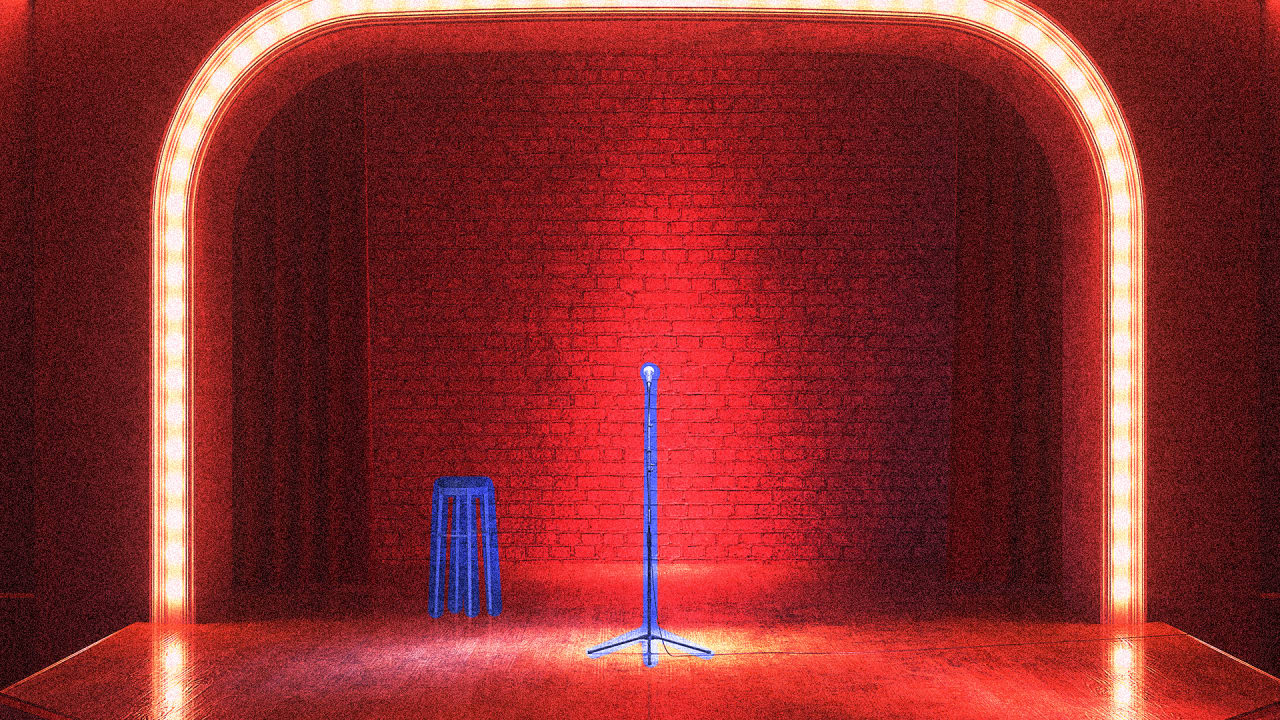
Up until March 7, I made my living as a touring stand-up comedian. I arrived back in Los Angeles on the 8th and dropped into a friend’s show on the 10th.
“How’s the crowd?” I asked my friend in the hallway.
“The good news is, they’re all enthusiastic,” my friend responded. “The bad news is their names are Ed, Frank, Rita, Gina, David, and Patty.”
There were six people at that show, as fears of the growing pandemic were already taking hold. And I haven’t played to an in-person audience since.
By March 12, I canceled the next two weeks of my calendar. By the 14th, I canceled the next month. I was terrified. I’d been a touring comedian for 18 years, and the road was all I knew. I figured I would spend the time writing or building a table in my garage.
But three days later, I had a planning call with comic Chris Bowers, who wanted to live-stream a talk show with a performance element, and another comedian friend, Ben Gleib, who wanted to open an online comedy club. The first would be an easier launch than the second. So the three of us teamed up for live streams while Ben and I strategized on how to turn a comedy club—something that revolved around the in-person experience—completely digital. I ended up learning three rules during this process.
Execute quickly
Execute your ideas quickly and decisively. By the time other comedians finished clearing their calendars, we had already been experimenting with live-streaming technology for two weeks.
All industries turned to the digital space, but stand-up was a challenge. We watched as people performed to muted crowds or prerecorded to no one alone in their bedrooms, and we quickly knew that wasn’t the answer. Imagine if pizza places were just trying to shove a piece of pizza into their camera—they’re missing half of the equation. So were these shows. They were missing the audience. They were missing the experience of people enjoying it.
A muted audience or a passive live stream was not the answer. But that was because comedians were asking themselves the wrong question.
The goal of a comedian has always been to play to the largest audience possible. Move from coffee shops to clubs, clubs to theaters, and theaters to arenas. Get a TV show. Get in movies. Go viral. Be seen. That is the question comedians were asking themselves: “How can I be seen by as many people as possible?” The desire to play to as wide an audience as possible led comedians to play to disrespectful audiences that needed to be muted.
Ask the right question
The question you ask is just as important as the answer you get. Instead of asking for the most people possible, Ben and I asked a different question: “How can we be seen by the best audience possible?”
From the first time I started producing shows 18 years ago, I always charged for tickets. I gave out comps occasionally, but it was apparent early on that people who don’t pay for a product don’t value that product. When people get free tickets to a show, they are more prone to disrespect it. And so our answer was simply to charge people and limit the number of tickets. And it worked.
We launched the Nowhere Comedy Club on April 6, with three shows staggered to accommodate different regions around the world. On that first day, we sold 600 tickets, and I toured the world without ever leaving my home.
It was, of course, not enough to charge people for the product. You can’t just charge people for any old product. The product had to be good enough to be worth the money.
Ben and I drew from our years of experience on the road. We opened “doors” early to let people get comfortable before the show. We played preshow music. We hired a staff to help run the shows (and the company). We upgraded our internet connections. We bought cameras and microphones and soundboards and green screens. Our goal in April wasn’t to earn a living—it was to break even.
And we did.
Invest in yourself
It is a very tough proposition to lose months of income and be willing to spend any money. But I’ve always lived by the idea that it’s never a good idea to buy half a pair of pants. You really need the whole thing. Don’t believe me? Look at someone wearing jorts. It’s ridiculous.
Since the club’s inception, we’ve sold over 15,000 tickets, averaging over 1,000 per week. In the club’s first six weeks, we generated over $100,000 in income for comedians. Meanwhile, we pivoted the live streams to make them charity fundraisers, allowing us to give out $1,000 survival grants to 24 more comedians. And we’ve been able to make a living.
As of today, my tour schedule is wiped out through the end of September. That is seven months off the road, eclipsing my previous record of two weeks. But, due to quick and decisive action, asking the right questions, and investing in myself, I’m not afraid of an empty calendar. And I can even perform in half a pair of pants if I want to. Comedy from home is waist up.
Sure, it would have been nice to spend this time building a table. But I’d prefer to be able to put food on it.
Steve Hoffstetter is a popular author, columnist, and comedian with over 150 million views on YouTube and 600,000 subscribers. He is the cofounder of Nowhere Comedy Club, the world’s first live digital comedy club.
July 27, 2020 at 04:00PM
https://ift.tt/302VyXo
How to survive losing months of work - Fast Company
https://ift.tt/2VuKK1x
Work

No comments:
Post a Comment